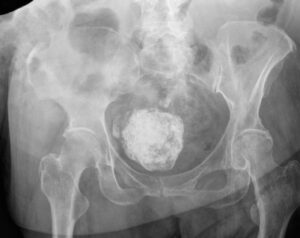Did you know that there are different types of fibroids? If you've been diagnosed with uterine fibroids, it means you have abnormal growths (made up of muscle cells and  fibrous tissues) in your uterus. These fibroids are non-cancerous, and can vary in size and location.
fibrous tissues) in your uterus. These fibroids are non-cancerous, and can vary in size and location.
While fibroids in any location have the potential to cause uncomfortable side effects, fibroids in certain locations will affect your ability to conceive more than others. Here's a basic guide to types of fibroids, based on location.
Fibroids that grow mainly away from the uterine cavity are called subserosal. Growths that form within the muscle wall are called intramural. And fibroids that grow into the uterine cavity are called submucosal.
Rarely, you may develop a fimbrial fibroid (also called a myoma.) With this growth, called a Type 8 fibroid, your tumor growth is completely distinct from your myometrium. (That's the muscular outer layer of your uterus.) With these rare types of fibroid, your fallopian tubes could get blocked, contributing to infertility.
So, while having fibroids doesn't mean you can't get pregnant, fimbrial, submucosal and intramural fibroids can make it difficult to become pregnant or carry your child to term. Pregnant women usually wait to begin treatment until after they've delivered, but if you're having trouble conceiving, seeking immediate treatment is a good idea.
These types of fibroids are very large. So they grow out of your uterus and into the cavity of your abdomen. (That's the definition of "Exophytic"--something that grows beyond the organ where it first developed.) Both subserosal and submucosal fibroids may be exophytic. Only intramural types of fibroids won't extend into your abdomen. So they're less likely to trigger abdominal bloating, frequent or incomplete urination, or pregnancy problems.
Obviously, a fibroid that is inside the uterine cavity (submucosal) is most likely to impact conception, but large masses in any location can also cause problems. In fact, a submucosal fibroid can make it 70% harder for a woman to get pregnant! Large fibroids take a toll on fertility in a variety of ways: they can change the shape of your uterus and cervix, or they can block or slow down the movement of a man's sperm or a fertilized embryo. They can also block your fallopian tubes from releasing eggs, or affect the quality and thickness of your uterine lining.
For all these reasons, women who know they have fibroids should consult with their doctors before trying to get pregnant. Even if immediate treatment is not necessary, knowing the size and location of your fibroids will help you make informed decisions throughout your conception and pregnancy journey. It's also important to let your fibroid specialist know about future family planning, as the course of treatment he or she recommends may differ based on your short and long term pregnancy goals.
If you're dealing with fibroids in any location, we're here to help. We offer minimally invasive fibroid treatments. So you can avoid hysterectomy and preserve the possibility of pregnancy. Now, UFE isn't right for every woman. But, when you come see our specialists, we'll discuss your family planning goals. And we'll help you make informed treatment decisions that work for your types of fibroids, and your future wishes. So book an appointment and begin your treatment journey!
As leading fibroid specialists in Houston, we can help you get back to doing the things you love – free of pain and symptoms associated with this diagnosis.

Scheduling
Please contact our dedicated specialists to schedule a consultation today.
2025 Houston Fibroids. All rights reserved. Website Design by Healthcare Success